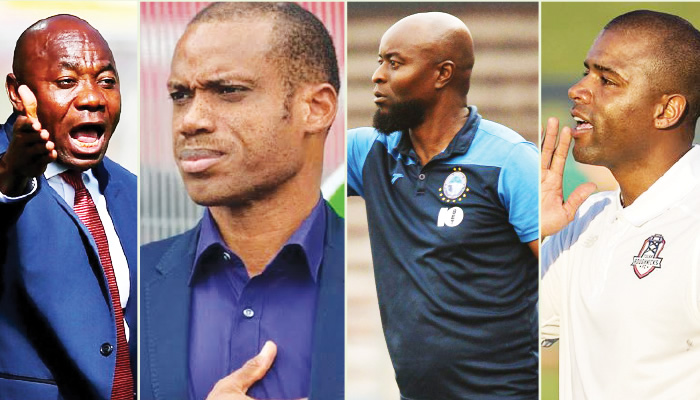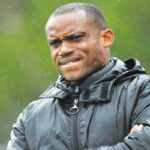
As the battle for the vacant Super Eagles head coach job heightens, EBENEZER BAJELA takes a look at the likely candidates who will succeed Jose Peseiro, in this report
Last Friday, the Nigeria Football Federation declared the position of the Super Eagles’ head coach vacant, following the exit of Portuguese Jose Peseiro, who led the side to a second-place finish at the AFCON last month.
Peseiro, who was appointed coach by the football governing body in 2021, was the national team’s 26th manager.
In an advertisement on its website calling for applications with a March 13 deadline, the football governing body stated that the prospective Eagles coach “must have proven experience at the elite level of football.”
Numerous coaches, both local and foreign, have expressed their desire to become the next Eagles coach, with reports suggesting that the NFF had received a plethora of applications.
However, Emmanuel Amuneke, who led the Golden Eaglets to win the 2015 U-17 World Cup, Eagles assistant coach, Finidi George, former Eagles captain and coach, Sunday Oliseh, U.S. men’s U-19 national team coach of Nigerian descent, Michael Nsien, former Abia Warriors and Katsina United coach, Henry Makinwa, former Cameroon coach Antonio Conceição, ex-international, Daniel Amokachi and Yusuf Salisu have all emerged the frontrunners for the Eagles job.
In all, reports say over 500 coaches applied for the post, with little-known names like Donald Malomo-Paris, who has a UK Pro Licence, also eyeing the job.
However, Amuneke, who holds the UEFA Pro License as well as the UEFA ‘A’ and ‘B’ coaching badges, is a favourite for the job. In an opinion poll conducted by PUNCH Sports Extra, fans and readers of Nigeria’s No.1 sports daily voted the Atlanta ’96 gold medallist as the next man for the vacant Eagles job, ahead of Finidi, Oliseh, Nsien and others.
The 53-year-old led the Golden Eaglets to win the 2015 U-17 World Cup, two years after winning the trophy as the team’s assistant coach.
The former Zamalek winger then guided the Tanzanian national team to the 2019 AFCON, the country’s first appearance at the tournament in 39 years.
Finidi, who placed second in the poll with 12 per cent, is highly considered for the job having led Enyimba to the domestic league title last term in just his second season in charge. The ex-international worked as assistant coach to Peseiro and has been appointed by the NFF to take charge of the team during the friendlies against Ghana and Mail next week.
The 52-year-old made a name for himself at Ajax in the Netherlands – being a leading figure in a team that won eight major titles, including the 1995 Champions League – before moving to Spain where he spent several years with Real Betis.
Oliseh, regarded as one of the best African midfielders of all time, has been without a job since August 2022 after quitting his role as head coach of German club SV 19 Straelen after just two months in charge, following a string of five defeats in five games.
During his stint with the Eagles, the former Borussia Dortmund midfielder had an impressive record in the seven games he was in charge of the side: three wins, one loss, eight goals scored and three goals conceded.
Barely eight months into his stay as Eagles coach, Oliseh resigned exactly a month to the team’s crucial AFCON qualifier against Egypt, citing contract violations, lack of support, unpaid wages and benefits to his players, assistant coaches and himself as reasons for his exit.
While he may not be a popular figure in Nigeria, Nsien, whose father hails from Eket in Akwa Ibom State, is one of the elite coaches revolutionising soccer and taking the game to the next level in the US, his country of birth.
The 43-year-old, who holds a US Soccer Pro License (the first African-American to earn it in 2020) and UEFA ‘A’ License, is seen by his peers in the US as a trailblazer in a sector with very few black coaches.
Nsien’s impressive work as a youth soccer coach in Tulsa caught the attention of the United States Soccer Federation officials, who named him their U-16 MYNT in November 2022.
The coach of Nigerian descent was quickly promoted to manage their U-19 team last September after guiding the U-16 MYNT to a 4-1-1 international record with wins against England, Japan, Nigeria and Wales before serving as an assistant to interim USMNT head coach B.J. Callaghan during the 2023 CONCACAF Gold Cup
Former Portuguese footballer Antonio Conceicao is another who will fancy his chance of coaching the Eagles following the resignation of his compatriot.
In a managerial career of over two decades, Conceição led a variety of Portuguese teams and won league and cup honours in three spells with Cluj in Romania. He also managed Cameroon to third place at the 2021 Africa Cup of Nations.
The 57-year-old Portuguese also has experience coaching in Cyprus, Portugal and Saudi Arabia.
Spain-based former Eagles forward Makinwa is also in the running for the coveted job after throwing his hat in the ring for the vacant head coach job.
The former Rayo Vallecano striker has a vast knowledge of the country’s domestic league, having coached in the NPFL for five seasons with Abia Warriors and Katsina United.
Makinwa has a UEFA Pro badge coach from the Spanish FA and spent majority of his career playing professional football in Europe, Africa and Asia.
As the country’s football-crazy fans wait anxiously for the NFF’s announcement for the 27th man to manage three-time African champions Super Eagles, it’s been a topsy-turvy ride for the team’s coaches right from when they were known as the Red Devils.
Starting with British Jack Finch, the first man on the national team’s hot seat in 1949, the team’s coaches have played a significant role in building the team and winning several trophies.
The Englishman, in his one-year tenure, was in charge during the Red Devils’ — as the Eagles were then known — tour of England and played without shoes. It wasn’t a barrier though, as they claimed a 5-2 win over Dulwich Hamlet and Bromley in their first-ever game.
He oversaw several friendly matches and although he left Nigeria for Valour of Iceland in 1950, he laid the foundation for coaches that handled the national team afterwards.
Thereafter, the first indigenous coach to handle the team Adewale Adegoke took over, winning amateur matches in Britain. Despite the low to zero funding and barefooted players, the team made a remarkable impact in their amateur friendlies.
Ever since it’s been a shift of baton between foreigners and homegrown coaches on who manages the team, with two foreigners — the Brazilian Otto Gloria (1980) and Dutchman Clemens Westerhof (1994) — helping Nigeria win the AFCON, with home boy Stephen Keshi adding a third continental title in 2013, the last time Nigeria conquered Africa.




